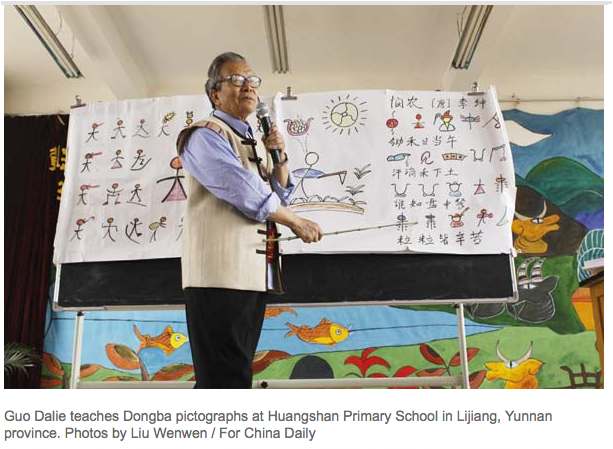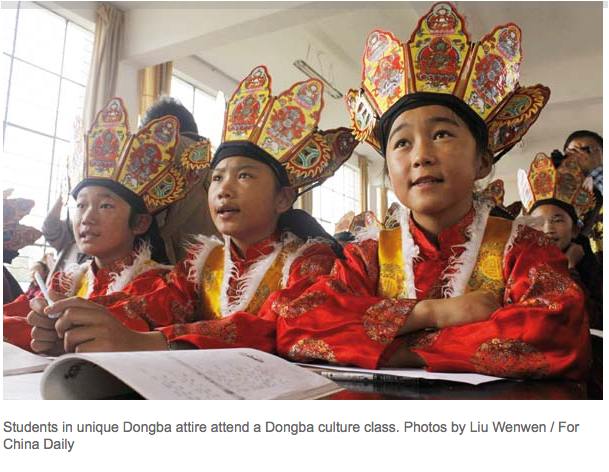"I speak the language I love, for that is me myself, I teach the language I love to children, to let them know who they are." Huang and her husband Guo, a Naxi Dongba culture scholar, have set up a class in 1999 at Huangshan Primary School to pass on Dongba culture, which they run every Thursday afternoon.
They teach children the Naxi language and culture.
Naxi people predominantly live in Lijiang, an ancient city on the UNESCO World Heritage List and about 600 km northwest of Kunming in Yunnan province.
The Naxi's culture derived from the Dongba religion about 1,000 years ago and the 1,300 Dongba written characters are the only existing primitive pictographs in the world.
Under the impact of modernization and globalization, however, just 20 percent of Naxi people can speak their own language and the proportion is declining. This situation worried Guo and his wife, which is why they turned to running classes.

"At a school we don't have to worry about a lack of students," Guo says.
In his Dongba language and culture class, poems are written both in Dongba pictographs and Chinese characters. Students read rhyming poems in the Naxi language. On each of their desks is a Dongba "picture-like" character card, from which they copy and learn characters.
"Most of the students, including the ethnic Han, can understand 400 Dongba characters. They can read and know the basic meaning of each character."
He Shanghua, the primary school's teacher in charge of the Dongba class, says all the school's Naxi students, and 60 to 70 percent of the Han students, can speak the Naxi language.
"Students like Dongba classes very much," says the teacher. "Outside class, we organize visits to the Dongba museum, Kingdom of Dongba and places of interest like that. Some students get composition awards for their Dongba themed articles."
"People are beginning to realize the value of Dongba culture and characters. Our class even attracts students from the United States and Japan." After 13 years, this bilingual education in Mandarin and the Naxi language has borne fruit.
A total of 217 students have graduated from the class and two of them continued their further education studying ethnic history and linguistic studies at university.

He Nanjiang, 22, is one of the first to have graduated from Dongba culture classes. He graduated from Yunnan Nationalities University, majoring in ethnic cultural studies. He is preparing to apply for a master's degree on Dongba culture at China Southwest Normal University.
He Jiquan, born to a Dongba family, used to be a Dongba teacher at Huangshan Primary School. He got his doctorate in Dongba language and culture this year, and begun to write and compile books on Dongba culture.
"That is what we are looking for," Guo says. "After years of studying and teaching, they have grown up and transmit the legacy of the Dongba culture. That means we have hope for future generations."
Contact the writers through liyingqing@chinadaily.com.cn.
| Attachment | Size |
|---|---|
| dongba1.jpg | 57.92 KB |
| dogba2.jpg | 46.61 KB |